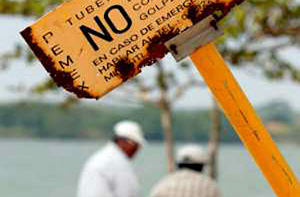 |
 |
 |
 Business News | March 2007 Business News | March 2007  
Mexican Leader Acts to Increase Dwindling Oil Production
 Marion Lloyd - Houston Chronicle Marion Lloyd - Houston Chronicle


| "Pemex has neglected oil exploration for years, and now it's going to pay a price."
- Francisco Garaicochea, former Pemex engineer |
In a bid to offset plummeting yields from Mexico's largest oil field, President Felipe Calderon unveiled plans Friday to boost production from a cluster of oil fields known as Ku-Maloob-Zaap.

He also announced an effort to speed its offshore exploration effort through an expanded technical cooperation agreement with the Brazilian oil company Petrobras.

"We are facing the urgent challenge of exploiting our underwater reserves," said Calderon while inaugurating a $250 million production platform at Ku-Maloob-Zaap.

Falling oil production is a worry here, because oil earnings are Mexico's top source of foreign income and account for 40 percent of the federal budget.

The platform, billed as Mexico's largest, will enable drilling on 28 new wells at Ku-Maloob-Zaap, a sprawling complex of fields that lie 65 miles northeast of Ciudad del Carmen in Campeche Bay. With estimated reserves of 4.9 billion barrels, Ku-Maloob-Zaap is the country's second-largest source of crude after the Cantarell field, a nearby oil giant accounting for 60 percent of Mexico's production.

Houston-based Halliburton is actively involved in developing the Ku-Maloob-Zaap fields through its oil service operations, Halliburton spokeswoman Melissa Norcross said.

Petroleos Mexicanos, Mexico's state-owned oil company, hopes the new platform will help boost daily production from 500,000 barrels to 680,000 barrels by the end of the year. That would help offset reduced production at Cantarell, which Pemex predicts will drop by 212,000 barrels a day this year.

Figures 'murky'

Oil analysts are skeptical of those production estimates.

"Pemex's figures have been particularly murky lately," said Jaime Brito, an analyst with PFC Energy in Washington, D.C.

He noted that last year it initially estimated that production from Cantarell would drop by 150,000 barrels a day, but it later confirmed the actual decline was more than 400,000 barrels — from 2 million to 1.57 million barrels a day since January 2006.

He also questioned whether stepped-up deep-water exploration will allow the country to maintain its output of 3 million barrels of crude a day, noting the long lead time needed to turn deep-water discoveries into producing fields.

Big fall predicted

David Shields, an independent oil analyst in Mexico City, cited studies predicting Cantarell's production would fall to one-third of its current level within three years, to 500,000 barrels a day.

"That is not something you can simply offset with a big platform, no matter how impressive the platform is," he said.

Brito also noted that the heavy crude being extracted from Ku-Maloob-Zaap sells for less than the higher quality crude from Cantarell.

"Our politicians should be much more open in recognizing the real challenge," Brito said.

"Pemex has neglected oil exploration for years, and now it's going to pay a price," said Francisco Garaicochea, a former top Pemex engineer. "You can be sure that their proven reserves will keep falling."

Calderon optimistic

Calderon said he was optimistic about Mexico's oil future. He cited studies estimating that Mexico has enormous potential reserves in the Gulf of Mexico and said the deal with Petrobras will help Mexico exploit them.

Pemex is also working to increase natural gas production, Calderon said. That could rise with plans to invest $273 million in the Burgos basin, Mexico's top area for gas production.

Mexico imports one-fifth of its natural gas and one-third of its gasoline.

"Strengthening Pemex is strengthening Mexico," Calderon said. "My government's energy policy is guided by a long-term focus." | 
 | |
 |



